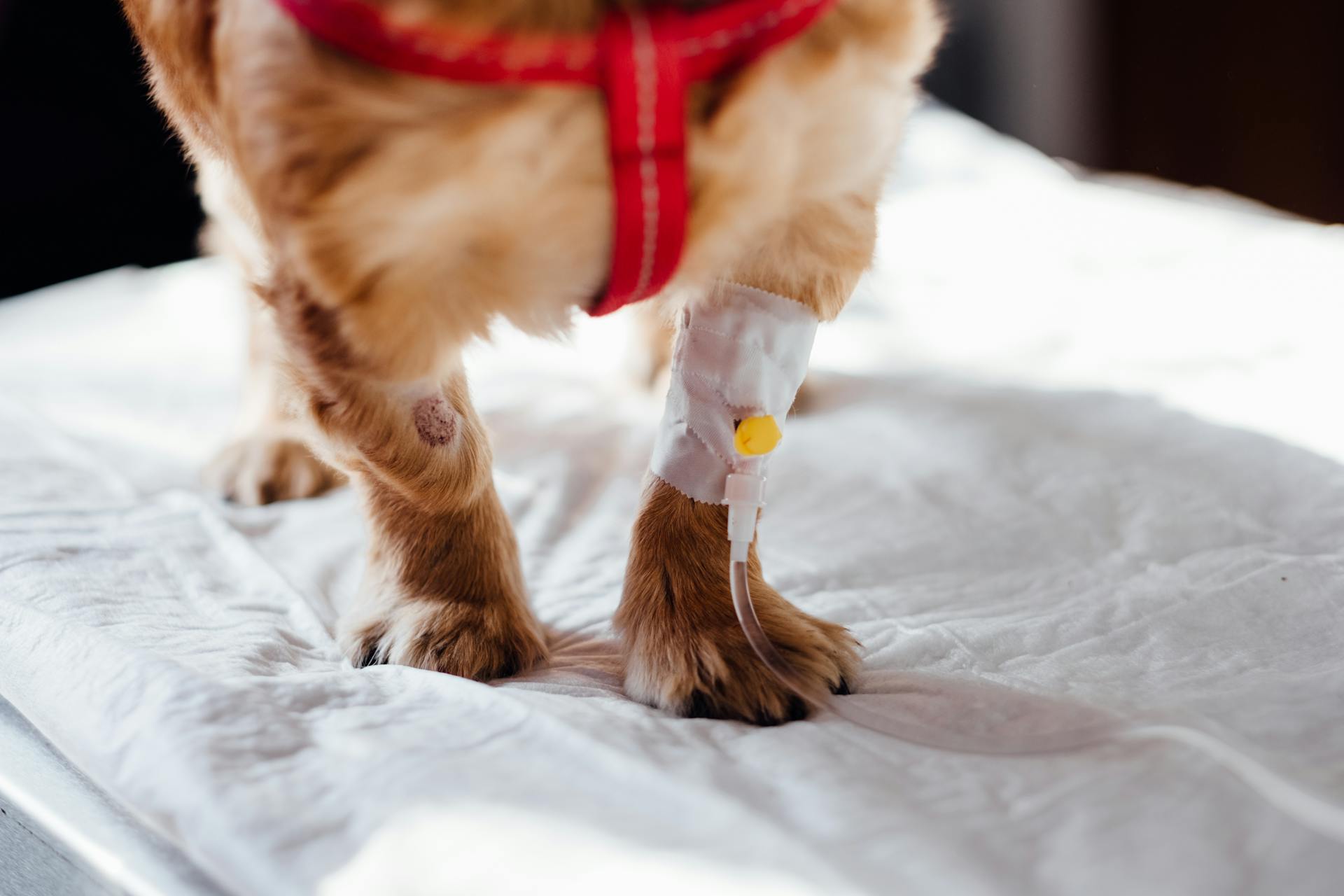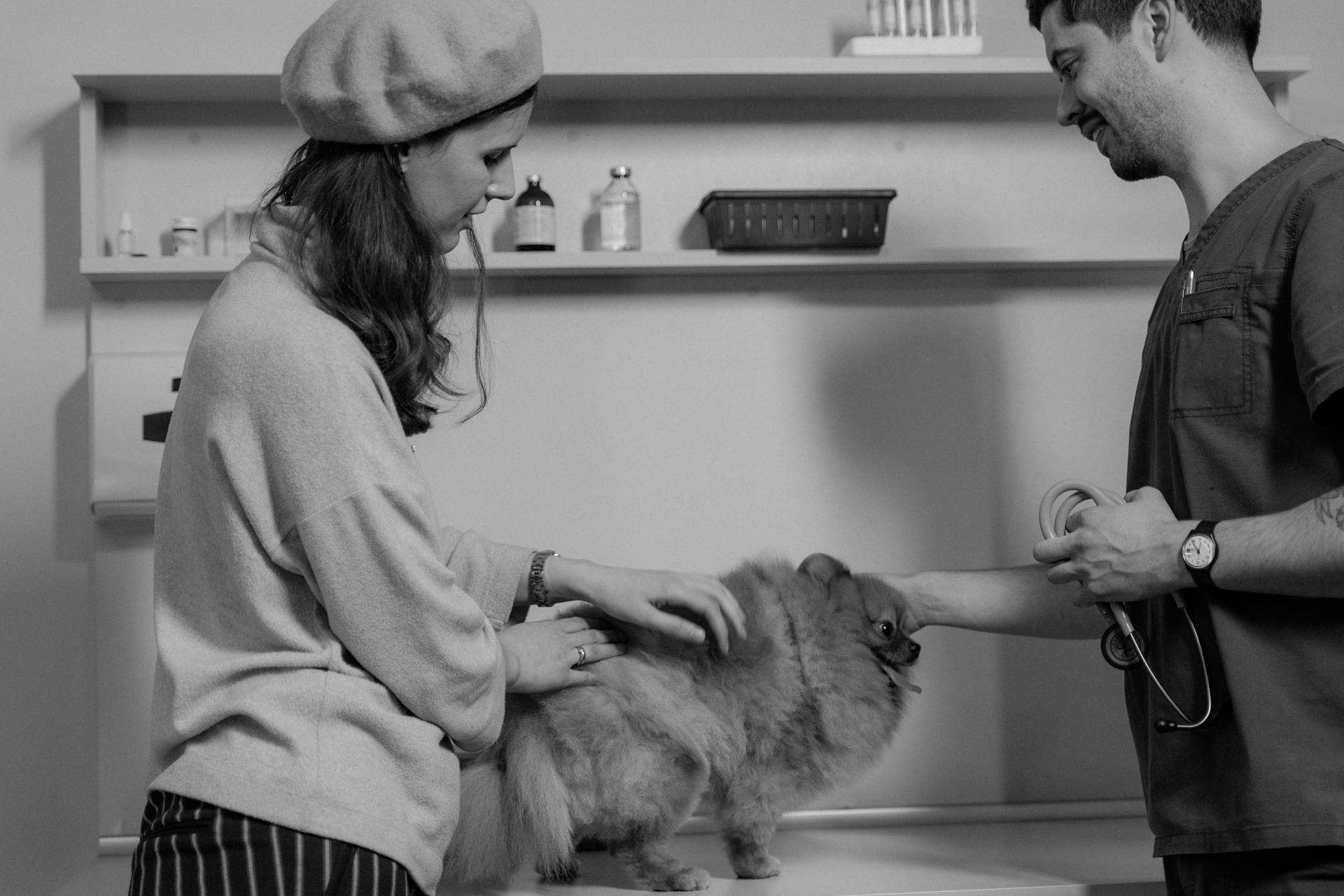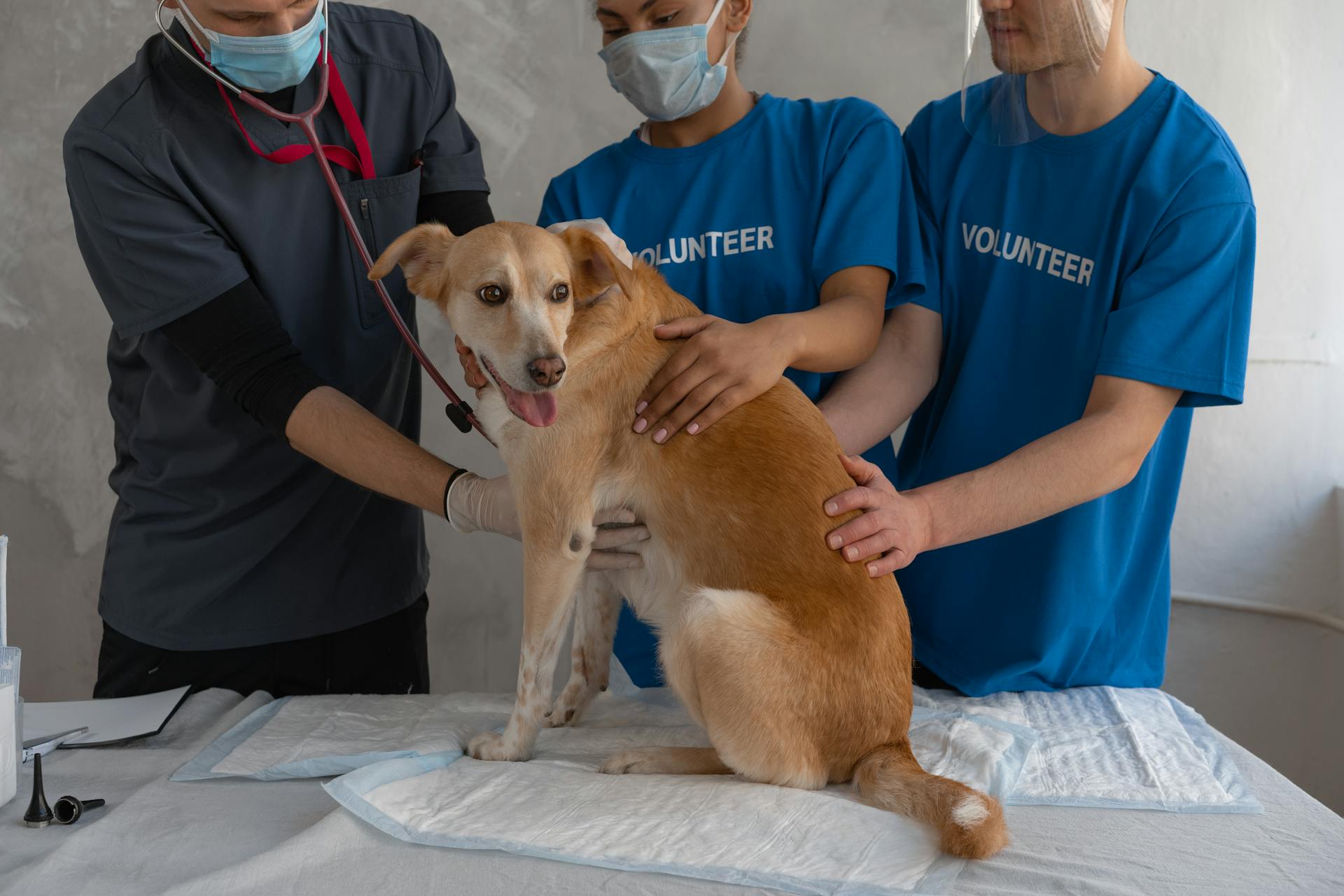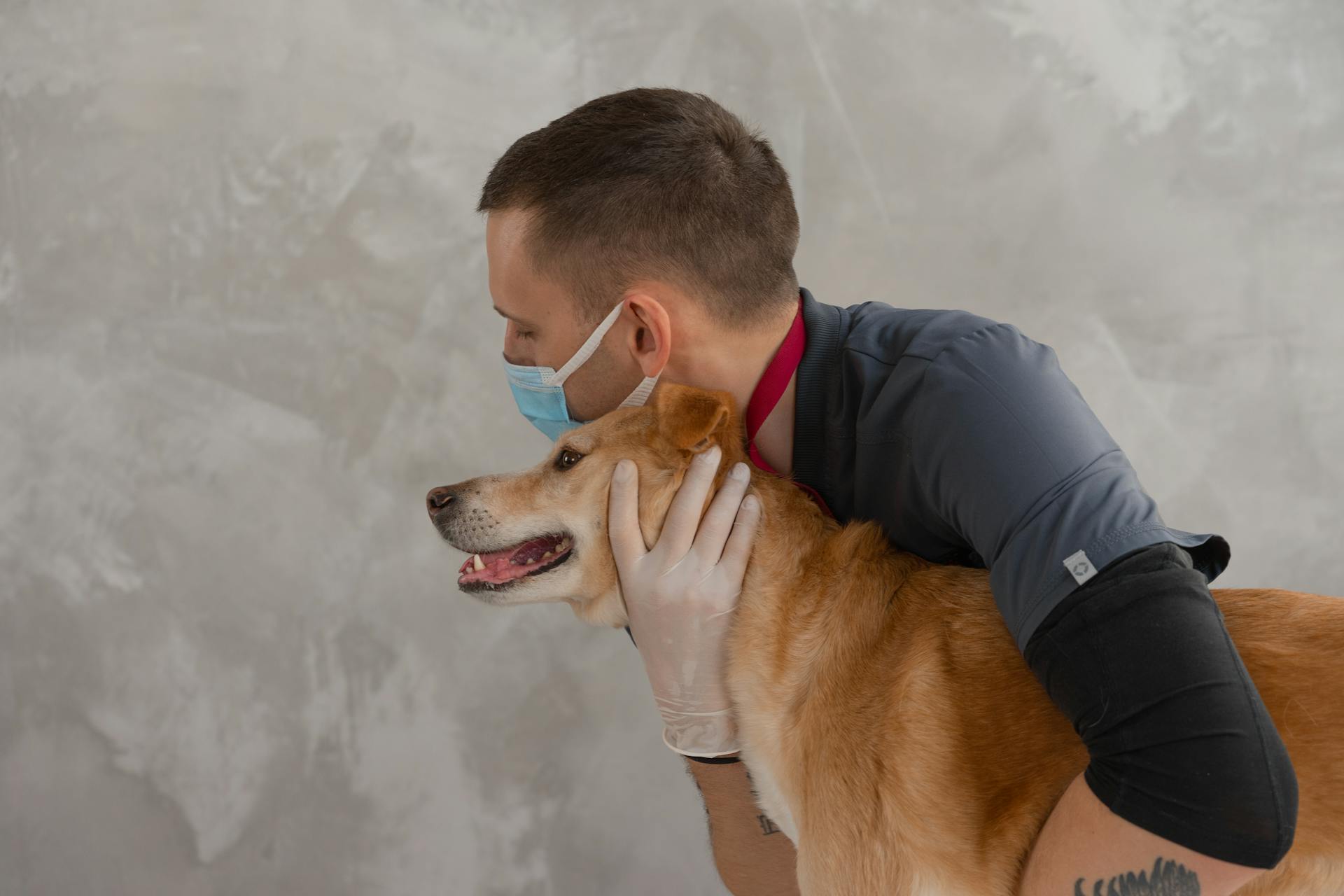
Kennel cough is a highly contagious respiratory disease that affects dogs, but it's not typically contagious to humans.
The primary cause of kennel cough is the bacterium Bordetella bronchiseptica, which is often spread through the air when an infected dog coughs or sneezes.
Symptoms of kennel cough in dogs can vary from mild to severe, but common signs include a persistent, dry cough, runny eyes, and lethargy.
Dogs can contract kennel cough through close contact with other infected dogs, contaminated surfaces, or even through the air.
Signs and Symptoms
The signs and symptoms of kennel cough can be quite distinctive. A persistent, forceful cough is the classic symptom, often sounding like a goose honk.
This cough can be quite loud and may be accompanied by other symptoms, such as sneezing, a runny nose, or eye discharge. In some cases, the cough may be chronic, lasting several weeks.
Some dogs with kennel cough may show other signs of illness, including a lack of appetite, depressed behavior, and swollen tonsils. Wheezing is another common sign of the disease.
For your interest: Symptoms Canine Diabetes
Here are some common signs of kennel cough:
- Loud cough, often described as a “goose honk”
- Runny eyes and nose
- Swollen tonsils
- Wheezing
- Lack of appetite
- Depressed behavior
In most cases, a dog with kennel cough recovers within one to two weeks. However, pneumonia can occur, especially in immunocompromised pets, including puppies, senior dogs, and brachycephalic dogs (like French bulldogs and pugs).
Causes and Transmission
Kennel cough in dogs is caused by a variety of bacteria and viruses, including Bordetella bronchiseptica bacteria, Canine adenovirus, and Parainfluenza virus.
These microorganisms can be spread through respiratory secretions, such as coughing or sneezing, and can also be contracted from infected objects like shared toys, food bowls, or water bowls.
Dogs are typically exposed to kennel cough in crowded areas, including animal shelters, boarding kennels, dog daycare facilities, grooming facilities, and dog parks.
Here's a list of the common causes of kennel cough in dogs:
- Bordetella bronchiseptica bacteria
- Canine adenovirus
- Parainfluenza virus
- Mycoplasma
- Canine influenza virus
- Canine distemper virus
- Canine respiratory corona virus
- Canine reovirus
CIRDC, or Canine Infectious Respiratory Disease Complex, is also contagious and can be spread through respiratory droplets, even before symptoms appear.
A fresh viewpoint: Respiratory Allergies in Dogs
What Is CIRDC?
CIRDC, or Canine Infectious Respiratory Disease Complex, is a collection of illnesses that can affect dogs. It's caused by a variety of viruses and bacteria.
Some common culprits behind CIRDC include canine parainfluenza virus, canine adenovirus type 2, and canine influenza virus. These viruses are highly contagious and can be spread through the air when an infected dog coughs or sneezes.
Other pathogens that can contribute to CIRDC include canine respiratory coronavirus, canine herpesvirus-1, and canine distemper virus. These viruses are often spread through direct contact with an infected dog's saliva, mucus, or urine.
Here are some of the key organisms that can contribute to CIRDC:
- Canine parainfluenza virus*
- Canine adenovirus type 2*
- Canine influenza virus (subtypes H3N2 and H3N8)**
- Canine respiratory coronavirus
- Canine herpesvirus-1
- Canine distemper virus*
- Bordetella bronchiseptica**
- Mycoplasma species
- Streptococcus equis subspecies zooepidemicus
*Protection available through standard vaccines.
**Protection available through additional vaccines.
Protecting your dog from CIRDC involves taking a few simple precautions. This includes making sure your dog is up to date with their recommended vaccines, such as adenovirus and parainfluenza.
How Dogs Get CIRDC
Dogs can get CIRDC through casual contact with other dogs, such as sniffing each other on a walk or playing together. This is because the contagious organisms can be spread through respiratory droplets from a cough or sneeze.
Some of these infectious organisms can even survive for a long time in the environment, allowing them to be spread through contact with contaminated surfaces or people's hands.
Dogs can also contract CIRDC from infected objects, such as shared toys, food bowls, or water bowls. This is a common way for the disease to spread in crowded areas.
Certain factors increase the likelihood of your dog contracting CIRDC, including stress, poor ventilation, and crowded conditions. If you notice your dog is experiencing stress or anxiety, it's a good idea to take steps to reduce their stress levels.
Here are some common places where dogs are typically exposed to CIRDC:
- Animal shelters
- Boarding kennels
- Dog daycare facilities
- Grooming facilities
- Dog parks
It's worth noting that dogs can even contract CIRDC from infected dogs before they show any signs of disease, making it a highly contagious and sneaky illness.
Other Causes of Kennel Cough in Dogs
Kennel cough in dogs can be caused by multiple bacteria and viruses, including Bordetella bronchiseptica bacteria, Canine adenovirus, Parainfluenza virus, Mycoplasma, Canine influenza virus, Canine distemper virus, Canine respiratory corona virus, and Canine reovirus.
You might like: Canine Distemper Virus Symptoms
Dogs can contract kennel cough from infected objects, such as shared toys, food bowls, or water bowls, which is a common occurrence in crowded areas like animal shelters, boarding kennels, dog daycare facilities, grooming facilities, and dog parks.
Kennel cough can also be spread through coughing or sneezing, which is why it's essential to keep your dog away from other dogs that may be infected.
You can find out more about the specific viruses and bacteria that cause kennel cough in the article section "Causes of Kennel Cough in Dogs".
Here's a list of common places where dogs are exposed to kennel cough:
- Animal shelters
- Boarding kennels
- Dog daycare facilities
- Grooming facilities
- Dog parks
Protecting My Dog from CIRDC
Keeping your dog's vaccines up to date is crucial in protecting them against CIRDC. Vaccines not only reduce the chance of your dog becoming ill, they also make your dog less likely to develop severe disease or spread the infection to other dogs.
Standard canine vaccines are highly effective against some CIRDC-associated viruses and are recommended for all dogs. For optimal protection against common respiratory infections, an annual intranasal vaccine against Bordetella, canine adenovirus type 2, and canine parainfluenza is recommended for dogs of certain at-risk groups.
Dogs can be contagious and still look perfectly healthy, so it's essential to keep them away from toys and food and water bowls used by dogs outside your household. This simple step can significantly reduce the risk of transmission.
Here are some tips to help protect your dog from CIRDC:
- Keep your dog away from toys and food and water bowls used by dogs outside your household.
- Stay informed about places or geographic regions where CIRDC has been reported.
- Delay or avoid travel with your dog to places where outbreaks are occurring.
- Wash your hands regularly, and especially after petting someone else’s dog.
Remember, CIRDC is very contagious and can be spread through respiratory droplets, so it's essential to take precautions to protect your dog.
Diagnosis and Treatment
Diagnosing kennel cough in dogs typically involves evaluating the dog's symptoms, history, and response to therapy, with diagnostic testing recommended in specific situations.
If your dog is showing signs of pneumonia, not responding to supportive care, or exhibiting systemic disease, your veterinarian may recommend diagnostic testing.
In most cases, treatment for kennel cough in dogs focuses on supportive care, such as encouraging rest, avoiding excitement and neck leashes, and providing nonsteroidal anti-inflammatory medications to reduce fever and inflammation.
Dogs with more severe illness may also benefit from fluids to treat dehydration.
What Is the Bottom Line on CIRDC?
CIRDC infection goes through yearly ups and downs, much like cold and flu infection in humans. This means it's a seasonal illness that can affect dogs at different times of the year.
It's essential to know the facts and put your dog's risk into context. CIRDC is a contagious disease that can be spread through casual contact, such as sniffing each other on a walk or sharing water dishes.
No matter the situation, it's always wise to practice good hygiene and infection control measures. Wash your hands regularly, especially after petting someone else's dog, to reduce the risk of transmission.
In an outbreak situation, try to avoid dog group contact where possible, including dog parks, daycare, and boarding facilities. This can help prevent the spread of the disease to your dog.
If you do suspect your dog has CIRDC, it's crucial to contact your veterinarian promptly. They can provide guidance on the best course of action and help your dog recover quickly.
Explore further: Difference between Kennel Cough and Upper Respiratory Infection
Here are some general guidelines to keep in mind when it comes to CIRDC:
- Make sure your dog is up to date with their recommended vaccines, including adenovirus and parainfluenza.
- Keep informed of any outbreaks of canine disease in your community.
- Practice good hygiene and infection control measures, such as washing your hands regularly.
- Plan ahead and check with state or provincial animal health departments/ministries if you're traveling with your dog.
How Is CIRD Diagnosed?
Diagnosis of CIRD typically starts with a visit to the veterinarian. If you suspect your dog might have CIRD, it's a good idea to call your veterinary clinic first to describe any signs you've noticed, so they can recommend next steps.
Most dogs with mild CIRD will improve fairly quickly, so there's no need for diagnostic tests in those cases. Your veterinarian will make a "presumptive" diagnosis of CIRD by thoroughly examining your dog for signs of illness, ruling out other causes of cough, and asking questions about exposure to other dogs or multiple-dog settings.
Testing is recommended when multiple dogs are affected (as in outbreaks), or if your dog seems to be getting worse despite supportive treatment. Your veterinarian will collect swab samples from the throat, nose, and/or edges of the eyes and submit those samples for lab testing to confirm infection and identify the specific bacteria/viruses involved.
Here are some scenarios where diagnostic testing is recommended:
- Dogs where pneumonia is suspected
- Dogs that do not respond to supportive care
- Dogs with signs of systemic disease
- If an outbreak is occurring in multiple dogs
In some cases, blood tests may be recommended.
How Is Treated?

Treatment for CIRDC depends on how sick the dog is. If your dog is mildly affected, they'll likely make a full recovery with basic supportive care.
This means encouraging your dog to rest and avoiding situations that promote coughing and irritate airways. Dogs with more severe illness may benefit from nonsteroidal anti-inflammatory medications.
These medications help reduce fever and inflammation. Fluids are also recommended to treat dehydration in dogs with severe illness.
Frequently Asked Questions
What happens if a human gets kennel cough?
If a human contracts kennel cough, they're unlikely to experience severe symptoms, but may be at a higher risk of developing lung conditions like pneumonia or upper respiratory tract infections. If you're concerned about kennel cough, learn more about its causes, symptoms, and treatment options.
How long should I quarantine my dog with kennel cough?
Quarantine your dog with kennel cough for 10-14 days to prevent the spread of the infection. After this period, your dog is likely no longer contagious
How long can kennel cough live on clothes?
Kennel cough bacteria can survive on surfaces, including clothing, for up to 48 hours. Proper hand and clothing disinfection between pets is crucial to break the transmission cycle.
How did my dog get kennel cough without being around other dogs?
Your dog may have contracted kennel cough through aerosols from an infected dog's cough or sneeze, or by coming into contact with contaminated surfaces, such as toys or food and water bowls. This means kennel cough can spread beyond direct dog-to-dog contact.
Can humans get kennel cough from vaccines?
No, humans are highly unlikely to get infected with kennel cough from the vaccine, as the bacteria used have been altered to be less infectious
Sources
- https://www.webmd.com/pets/dogs/kennel-cough-in-dogs
- https://www.avma.org/resources-tools/pet-owners/petcare/canine-infectious-respiratory-disease-complex-kennel-cough
- https://www.petmd.com/dog/conditions/respiratory/kennel-cough-dogs-symptoms-and-treatments
- https://www.pethealthnetwork.com/dog-health/dog-diseases-conditions-a-z/kennel-cough-signs-and-symptoms
- https://affordablecareveterinaryclinic.com/news/the-facts-about-canine-infectious-respiratory-disease-complex-kennel-cough
Featured Images: pexels.com


